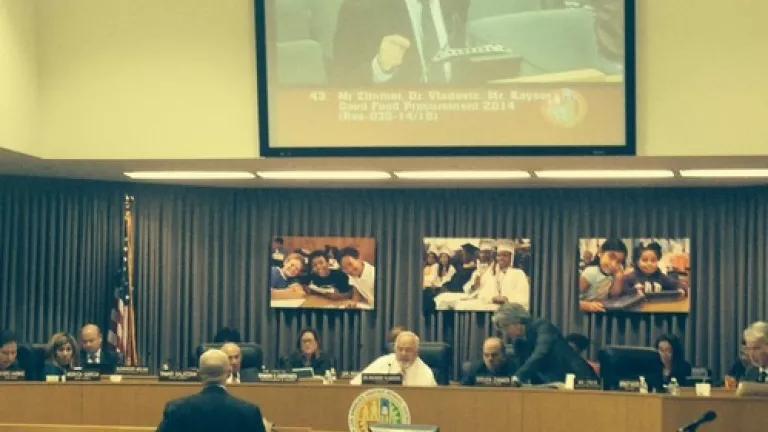
Today, the Board of Education of the City of Los Angeles voted to reaffirm the Los Angeles Unified School District’s (LAUSD) commitment to the Good Food Purchasing Policy — a significant and vital step in efforts to help improve the quality of our school meals and rebuild regional food systems. My colleague Mark Izeman and I were able to attend today’s Board meeting and voice NRDC’s support for passage of this forward-thinking resolution.
NRDC's Mark Izeman's at today's LAUSD Board of Education meeting.
LAUSD is the second largest school district in the country — serving 650,000 meals each day — so they buy an enormous amount of food. Good purchasing by the district can influence how food is grown in the region — and begin to teach kids about the enormous impact of the food they eat.
At NRDC, we are big believers that institutional purchasers have the power to drive markets for more sustainable goods. And the Good Food Purchasing Policy helps them do just that. My colleague Claire has written about the Good Food Policy in the past, and the leadership role of LAUSD in its implementation, but in short, the Policy sets forth standards and goals for purchasers to improve the food they buy in five key categories — local economies, environmental sustainability, valued workforce, animal welfare, and nutrition.
NRDC strongly supports the Guidelines, and in fact, we played an advisory role in their development. We are so pleased to see LAUSD’s commitment to making the Guidelines a reality.
Today’s resolution reaffirmed the district’s commitment to the Guidelines but also contained a number of new specific action items, including a requirement that request for proposals for LAUSD’s poultry procurement meet the antibiotic requirements of the Guidelines (i.e. no non-therapeutic use). I want to focus on this particular action item, and some important related news, but first I want to highlight a few of the many environmentally beneficial parts of the broader guidelines.
First, NRDC commends the Board, the Los Angeles Unified School District, and the Good Food Guidelines for prioritizing food grown in way that reduces harm to the environment -- which can include certified organic farms and farms that work to reduce pesticide use, build soil health, and conserve water.
Second, we applaud the Guidelines for encouraging reduced consumption of animal products, as livestock farming is one of the most significant contributors to climate change and other environmental problems associated with agriculture.
Finally, we support the purchasing of lower-grade (cosmetically imperfect) produce to reduce food waste on farms. These, and other aspects of the Guidelines, are powerful ways for LAUSD to make positive changes for the environment, economy and communities in their region.
As for requiring the purchasing of antibiotic free chicken, the Resolution set forth in item #43 of today’s meeting directed the Superintendent of Schools to include in their food Requests for Proposals “a requirement that poultry RFPs and contracts should meet antibiotic and hormone-free standards” of the Good Food Guidelines.
In technical terms, this is a “big deal.”
Why? Because antibiotic resistance is a growing public health crisis. Today, 80 percent of the antibiotics sold in this country are used in animal agriculture — and often not to treat sick animals, but instead to speed up growth and to compensate for overcrowded, unsanitary conditions. This creates the perfect breeding ground for antibiotic-resistant bacteria to thrive. These superbugs can travel off the farm into our communities — on our meat, in the water, and in the air.
Leading public health and medical organizations including the World Health Organization have warned that the widespread overuse and misuse of antibiotics for animals is a contributor to the dangerous rise of antibiotic resistance in humans. According to the CDC, antibiotic resistance is “one of the world’s most pressing health problems.” The CDC has also said “much of antibiotic use in animals is unnecessary and inappropriate and makes everyone less safe.” In short, stopping the misuse of antibiotics in agriculture is vital to ensure our antibiotics work when our kids and our families need them.
By itself, Los Angeles’s commitment to buy chicken produced without unnecessary antibiotic use is a critical step to address our nation’s mounting antibiotic resistance crisis.
But LAUSD is also now part of the Urban School Food Alliance, which is a coalition of six of the largest districts in the country (New York City, Los Angeles, Chicago, Dallas, Miami, and Orlando). The overarching goal of the Alliance is to leverage their joint food purchasing power — $550 million per year — to not only help get better food for kids in their six cities, but also to help drive the market for affordable, healthy and sustainable food for all schools across the country.
Representatives of the New York City School Food and the Alliance joined us at the Board meeting and it was great to see these cities working together on such an important issue. The Alliance is making landmark strides on antibiotic use as well — see my colleague Mark’s blog for an exciting national announcement made today by all six districts.
In sum, it has been a remarkable day of forwarding-thinking action on better school meals and powerful market signals for healthier food everywhere, in Los Angeles and across the country. As my colleague Sasha has said, “consumers are driving real change in the marketplace and the dominos are falling” on antibiotic use in poultry!

